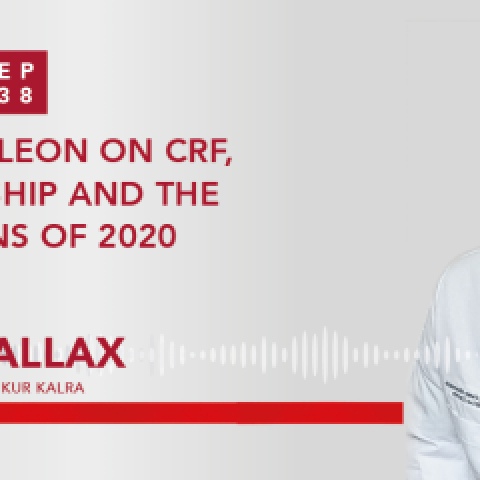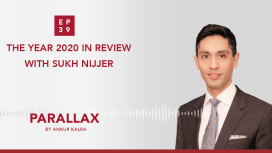
In the late 1980s, shortly after he left the NIH, Dr Martin B Leon founded the non-profit organisation, Cardiovascular Research Foundation (CRF). At the beginning, CRF had almost no funding or people, but it had a concept of bringing together an academic community to follow the device development cycle from inception to inclusion. Today, CFR is a global entity, and its events are attended by hundreds of physicians/researchers worldwide.
In the Season 2 finale, Ankur Kalra is joined by the legendary Martin B Leon, Professor at Columbia University, director of the Transcatheter Cardiovascular Therapeutics and chairman emeritus of the CRF.
In this in-depth discussion Dr Leon talks about what he believes is behind the success of CRF and the lessons he learnt from disappointments and mistakes along the way. Dr Leon stresses the importance of collaborations on a global scale. He talks about his plans for the future and the issues that were highlighted by the events of 2020. Ankur asks Dr Leon about his role as a mentor and about the qualities he is looking for in a mentee.
What makes Dr Martin B Leon tick? What is his message to cardiologists and/or researchers at the beginning of their careers? How did the pandemic and his work as a clinician in New York change his perspective?
Hosted by @AnkurKalraMD.
Produced by @RadcliffeCARDIO. Submit your questions to Ankur via: podcast@radcliffe-group.com.

Which COVID19 patients require risk stratification with a stress test? What are the take-home messages for physicians taking care of patients diagnosed with COVID19? What were the key trials of 2020? What can we learn from the negative results of the STRENGHT study? How have studies like STOP-AF influenced clinical practice?

Having recently applied for the programme himself, Ankur also speaks with Hari about the history, purpose and future of the Society for Cardiovascular Angiography and Interventions (SCAI) Emerging Leader Mentorship (ELM) Fellowship Programme. Submit your question to: podcast@radciffe-group.com. Guest @SrihariNaiduMD.
Hosted by @AnkurKalraMD. Produced by @RadcliffeCARDIO.

In the final episode of our burnout and resilience series, Kavitha and Ankur give you some practical tools of self-care to help you avoid burnout. Kavitah Chinnaiyan, MD, is an award-winning author and, Cardiologist and Director of Cardiac CT Research at Beaumont Health, MI. Send us your thoughts to this episode for Ankur to share in future episodes: podcast@radciffe-group.com. Guest @ChinnaiyanMD.
Hosted by @AnkurKalraMD. Produced by @RadcliffeCARDIO.

In our second episode on burnout and resilience, Kavitah Chinnaiyan, MD, and Ankur take a deeper dive into mindfulness and training the brain to move from Default-Mode to Task-Positive Networks. Kavitah is an award-winning author and, Cardiologist and Director of Cardiac CT Research at Beaumont Health, MI. Send us your thoughts to this episode for Ankur to share in future episodes: podcast@radciffe-group.com. Guest @ChinnaiyanMD.
Hosted by @AnkurKalraMD. Produced by @RadcliffeCARDIO.

Hosted by @AnkurKalraMD. Produced by @RadcliffeCARDIO.

Ankur and Madhav also discuss positive traits of leadership, why we should embrace failure and the importance of mentorship throughout all stages of one’s medical career. Send us your comments to this episode for Ankur to share in future episodes: pocast@radciffe-group.com. Guest @mswami001.
Hosted by @AnkurKalraMD. Produced by @RadcliffeCARDIO.

Harriette is an Associate Professor of Medicine at the Department of Medicine, Cardiology and the Department of Health Research Methods, Evidence and Impact at McMaster University and the Population Health Research Institute in Hamilton, ON, Canada. In this episode, Ankur and Harriette discuss why this issue is so contentious, what the current state of medical walls represents, why this may be an issue and what alternative medical walls could look like. Harriette also shares her thoughts on how this topic relates to the maintenance of hierarchical power structures in academic institutions, calling for more collaborative leadership and management styles. Guest @hvanspall.
Hosted by @AnkurKalraMD. Produced by @RadcliffeCARDIO.

In this episode, Ankur and Danielle speak about the evidence in favour of a whole-food plant-based diet to improve cardiovascular health, the ACC prevention guidelines, how to talk to patients about positive dietary change, the issue of lack of nutrition training in cardiovascular fellowships and what Danielle’s diet looks like as a busy whole-food plant-based cardiology fellow. On her own podcast ‘Nutrition Rounds’ Danielle has discussions about evidence-based plant-based nutrition with physicians who are leading experts in nutrition and health.
Hosted by @AnkurKalraMD. Produced by @RadcliffeCardiology.

In this brilliant conversation, Ankur, Emmanouil and Michael unravel the potential advantages, challenges and practical realities of using drug-coated balloons in SVD, and the findings of the latest randomised controlled trials studying this area.
Hosted by @AnkurKalraMD. Produced by @RadcliffeCardiology. [Disclaimer: The use of drug-coated balloons in coronay intervention is still off-label; it has not been approved by the FDA.]

Dawn is an associate editor of the journal Circulation: Cardiovascular Interventions and is widely known for her research program on PCI and peripheral arterial disease (PAD). Ankur and J. Dawn discuss multiple trials/studies that were published in 2018, including ORBITA, PIONEER-II and ABSORB. J. Dawn also shares her thoughts on the latest stent technologies.
Hosted by @AnkurKalraMD. Produced by @RadcliffeCardiology.

They discuss the importance of preventative medicine, their experience of reducing hypertension with non-pharmaceutical and pharmaceutical methods, and the significance of the integrated “team approach” when treating comorbid conditions such as hypertension. Athena also shares her thoughts on cardiologists’ responsibility to shape their patients’ lifestyle choices.
Hosted by @AnkurKalraMD. Produced by @RadcliffeCardiology.

Ankur Kalra asks Grant W Reed, Director of the Cleveland Clinic’s STEMI program, to reflect on the actions they took and the challenges of delaying cardiovascular procedures in the wake of the coronavirus pandemic. Dr Reed offers insight on the factors that influenced the Cleveland Clinic’s STEMI policy for COVID-19. Ankur and Grant discuss the triage considerations for patients with structural heart disease and the steps the clinic took to protect its healthcare workers.

In this edition of Parallax Dr Kalra asked Dr Rosenbaum about the influences that shaped her choices as a writer and as a healthcare professional. Dr Rosenbaum opens up about her childhood and how she connected to her grandfather through writing and medicine. We learn about Lisa’s first day at medical school and her latest writing project.

Jagmeet P Singh, associate chief of the cardiology division at Massachusetts General Hospital and professor of medicine at Harvard Medical School joins Ankur Kalra for a deep conversation about his journey across three continents. Dr Singh talks about the importance of choosing fulfilment over success. We gain more insights on the recent late-breaking trial, MADIT-CHIC focusing on cardiac resynchronization therapy. Ankur asks Jag about his experience of being on the other side of the healthcare system and his enrolment in the since halted remdesivir trial.

Prof Michele Senni is Director of Cardiology at Papa Giovanni XXIII Hospital, Bergamo Italy. He contracted COVID-19 himself and in this latest podcast he meets with Ankur Kalra, MD to discuss his personal experience in dealing with patients and COVID-19 in Europe’s outbreak epicentre.
Hear them discuss the burden on healthcare, patient selection, the importance of testing and PPE and how COVID has resulted in a reduction of acute myocardial infarction and heart failure in patients.

In this latest episode, Ankur Kalra, MD meets with Andrew Sauer, MD, co-author of an upcoming paper in US Cardiology Review on COVID-19 and Cardiovascular Disease that provides a concise and current summary of cardiovascular complications from COVID-19.
Hear them discuss the latest issues surrounding the pandemic, the known cardiac implications and the rapidly emerging data.






